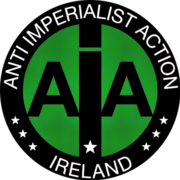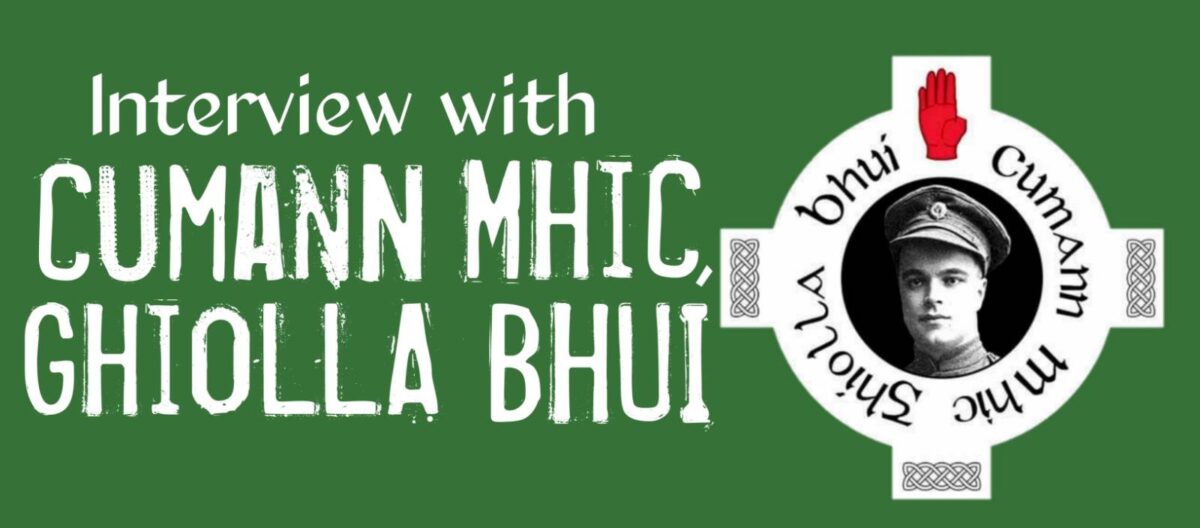Can you tell us a bit about how the McKelvey’s was formed?
In 2019, several former activists, ex-prisoners with local Republicans and Gaels came together to commemorate the establishment of the 1919 Dáil. We played a game of proper football for the McKelvey cup in Belfast. It was at this time we decided to form a craobh of Conradh na Gaeilge and chose to promote the language through Gaeilge games. We resurrected the long gone GAA club of Joe McKelveys as a social outlet for Republicans and the sport has brought many of them in from the cold and made the Irish language accessible. We belief that Gaeilge is, presently, our most important weapon against the state of neo-colonialism in Ireland.
In 1998, we moved from Colonialism to neo-colonialism and as such the arena of war has changed. Challenging globalisation through the language, arts, sports, and culture is the way forward.
Our core aim is the promotion of the Gaeilge Identity at the expense of the current Anglo Irish identity forced upon us.
What kind of activities have the McKelvey’s organised?
McKelveys have been busy this last few weeks! We have been restructuring our Irish language section in order to provide more Irish classes. At the moment, we provide for beginners only, however this is likely to change. Our original rang have been working everyday on their Gaeilge and the growth has been beyond what we expected.
The Irish classes are the most important aspect of our work. Producing Gaeilgeoirí is the main aim of our work, however we recognise that use of the language in a social environment is not always possible so we aim to provide social events for our members to practice their language. Social Gaelic Games will return as soon as possible. We also aim to provide evenings of music and dance in the near future.
You’ve been organising regular Irish language classes online recently. Do you see this expanding to offline meetings as well when the pandemic ends?
Of course, and we are looking forward to returning to face to face teaching, as everyone knows, online teaching has its draw backs. We are working now on establishing a base from which to work. This will not be easy, as we are not a cash fluid organisation, however, we will persevere.
Our aim in many ways is to mimic the achievements of Glór na Móna in the west of the city and to become as strong as they are now. This will take years of hard work, however the current online classes are a building block on that road.
It is important to us that the Republican history of our city is not lost at the same time. The greatest player in the history of the first McKelveys was Jimmy Steele, who promoted Gaelic Games, the Irish Language and the Irish Republic his whole life. We have a rich and vibrant history which stands to be lost to globalisation and anglicisation in North Belfast.
You’ve mentioned that there was a previous McKelvey Club, could you tell us a bit about it?
The McKelvey club had a short storied run in the County and by no means are we to claim their history as our achievements. The club came about at the time of the reorganisation of the IRA after the war of independence, after a split from the Ó Donovan Rossa club, which is still going strong to this day. Several of our key members are senior players for the Rossa club, and we wish them all the best in both the senior football and hurling championships this year.
The club had a huge influence in the county until the Crown Lane entry raid when Jimmy Steele and other very important members were arrested and imprisoned for treason felony. The club in fact competed in the Senior County Final in 1932 but lost out to the famed Cu Chulainns of Dunloy. Jimmy Steele’s GAA career was spent for the most part in the Crum unfortunately.
It is a truly rich history we wish to preserve and promote side by side with our language and culture.
What do you think is needed to revitalise the GAA, particularly in Belfast?
There is no one body with all the answers to the problems the GAA face across the island. Increasing commerical potential, a push towards professionalism, and the ever present clash between club and county are systematic problems. In Belfast, we also face the problems of gentrification, economic disparity and English soccer.
Proud working class areas in our city no longer boast famed clubs steeped in the history of the organisation. Areas like the Short Strand, Divis, the lower Falls road and arguably Clonard are lost to Gaelic Games, and that is to name a few. The fault is not soley with the GAA in the county, as apathy towards the sports prevails in these districts. We need to change that attitude.
That is not to say there hasn’t been a shift away from the traditional heartlands to a more affluent position in society. The North was slow to catch the South because of the War. With that, the GAA has morphed from the Gaelic sporting outlet for Irish and Nationalist communities into a vast, money generating, networking initiative where it is would be more beneficial to be a very small cog in an industrial sized but success senior club than the heart and soul of a small junior club at the heart of your community. Smaller clubs have been priced out of existence, and so have many of the working class in honesty. Membership fees keep growing while wages and income do not. The exclusivity, or status symbolism, of the sport runs against the very ethos of the organisation in terms of participation.
Are there any other clubs similar to yours that you would recommend people look into?
Flatly, in Belfast, no, there is not, however, we are trying to encourage the growth of such ideas. Currently, the only provision of social Gaelic games in Belfast, officially, is the South Antrim leagues. These are more often than not counter-productive but that is an argument in and of itself. Outside officialdom, GAA members are left to organise their own social sport at their own cost, much like 5 a side soccer.
We are of the opinion that it is a missed opportunity. In Belfast, we either do not have enough clubs or we do not have enough teams in clubs, but we do not provide enough options.
Social football and hurling is very strong in Belfast presently. The half paced hurling in the North and West of the city has been a huge hit. The provision in the North has actually led to 30 odd men coming together and forming a new club. A massive positive for the area.
Seán Russells, our sister club in Dublin, had been organising and we wish them continued success.
Where can people follow the clubs activities or join if they’re looking to?
We are all over social media! People can follow us on twitter, our handle is @cummanB and on facebook. We are not a political organisation, a historical one at most, but we are open and visible. Anyone who wishes to join our classes to learn Irish can get in touch with us, our classes are free and taught by committed Irish language activists.
Our football events are, normally, well advertised, and anyone who wants to take part can feel free to do so. Until lockdown comes to an end, we will be restricted to online activity but we look forward to finishing the calendar with the McKelvey cup, the now annual match against Seán Russells and we hope to fit in a few more games around the country.

